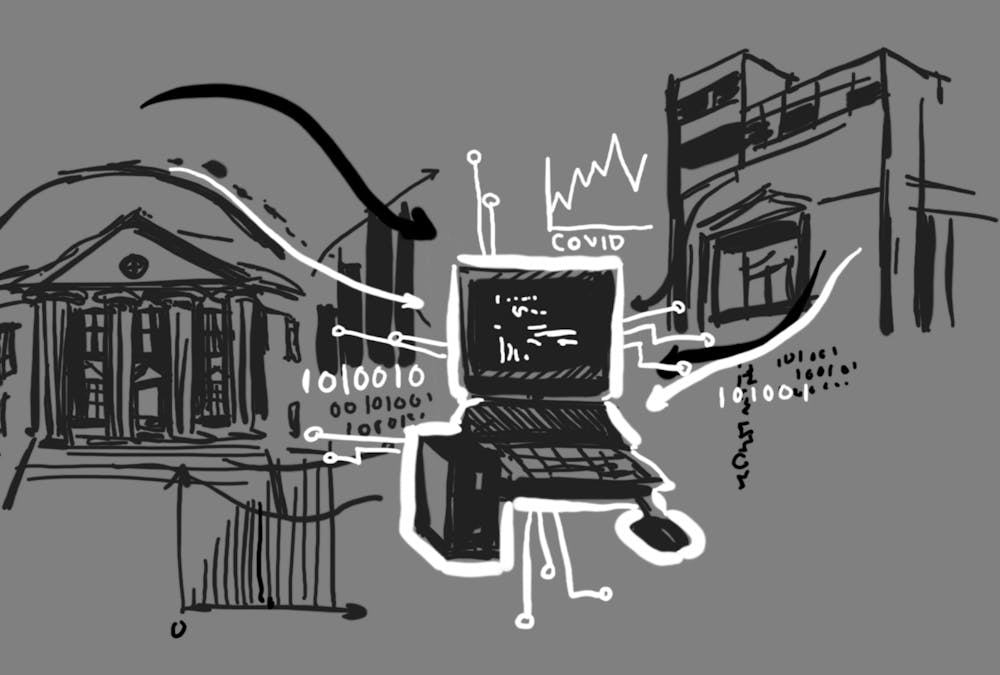The coronavirus pandemic has sparked research initiatives across a variety of disciplines. As researchers investigate the consequences of the virus, they require secure systems to ensure the safety of sensitive health data. Last year, University personnel established the high-performance computing system Virginia Assuring Controls Compliance of Research Data to aid institutions across the Commonwealth with their research efforts. The grant, funded by the National Science Foundation, was recently expanded to ACCORD-COVID, which serves institutions around the nation.
ACCORD was initially designed for smaller institutions in the Commonwealth of Virginia. Ronald Hutchins, vice president of information technology at the University, described that many of these schools have health-related projects in place. However, they cannot further their research without proper tools to ensure that a subject’s health data is stored safely.
“There is a lot of the science that happens in the small areas — small professors who have ideas that just have no way of managing them because they're in smaller schools,” Hutchins said. “Our goal was to try to enable those folks who were not able to do this kind of research.”
Efforts to develop ACCORD began three years ago. Hutchins and his team proposed the idea to the NSF and went through multiple rounds of feedback and revisions to simplify the system. In October of 2019, they finally received a $2.5 million grant to develop the infrastructure.
Once the pandemic hit, the team realized the potential to adapt the system for coronavirus-related research efforts across the nation. Hutchins noted an expansion in research projects in the past few months, and these studies encompass a multitude of fields. Regardless, they all require computing systems that will ensure the safety of personal health data.
“We've seen so many different entities, laboratories and research facilities shift their focus away from whatever it was they were doing [to] COVID research. That's been a powerful thing for us,” Hutchins said. “I think we've made more progress than we could have otherwise.”
Tho Nguyen, senior research program officer in the University’s engineering department of computer science, mentioned that the group proposed the idea for ACCORD-COVID to the NSF. The foundation was very supportive, and after a quick turn around, the team received a $1.2 million grant expansion.
Once an institution becomes affiliated with ACCORD-COVID, researchers complete projects and data analysis normally. ACCORD-COVID provides the platform to store data, and it offers many features to simplify the storage process and ensure security.
“We've protected the data in a similar manner and even more stringently than we protect the data for the hospitals,” Hutchins said. “In fact, we designed the ACCORD project to house federal data which is even more tightly controlled than health data. It’s built according to federal standards, which makes it a bit more cumbersome for the researchers to [access], but it makes [the data] much more secure.”
In terms of security, Nguyen stated that the system complies with federal regulations outlined by the Health Insurance Portability and Accountability Act.
“The beauty of ACCORD is really helping people meet the policy requirements around sensitive data so that they’re not bringing in unlisted research to their institutions,” Nguyen said. “In fact, that is probably the hardest issue to deal with right now.”
Another unique feature of ACCORD-COVID is the use of containers. Rick Downs, director of research computing at the University, described containers as sub-machines within the virtual environment of ACCORD-COVID.
Containers are launched based on the type of research conducted and are torn down when the research is complete. This approach provides an organized storage system for researchers that works in the background.
“The researcher says I need to do this particular type of work, and these sub-machines will spin up,” Downs said. “They'll be able to access them … and then that container gets torn down. If they have a complex workflow they might be dealing with three, four or five containers, but to them, it's all a very seamless workflow that just passes one thing to the next.”
ACCORD-COVID also uses federations, which allow researchers to log into the system using their home institution’s credentials. For instance, researchers at the University would log in using their Netbadge information. Then, they would be connected to the system, thus providing seamless integration between a home institution’s service and the ACCORD-COVID platform.
“For the researcher, it really hides all this infrastructure, all this back-end stuff going on, and just allows them to focus on the research,” Downs said. “That’s really what researchers want to do. They just want to get their work done, and they don't want to have to know what's behind the curtain.”
Currently, ACCORD is in use at institutions such as George Mason University and the Virginia Tech Carilion School of Medicine. The infrastructure for the computing system is built, but the team is currently working on overall policies and contracts before extending the service outside of the Commonwealth. They hope to provide their service to other NSF-funded researchers within the next few months.







